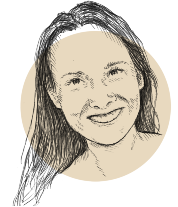We could have met her in Paris, her home away from home where she spends three months in her pied-à-terre every summer. But it is in Connecticut, where she teaches, that Alice Kaplan discussed the birth of Maison Atlas, her first novel which has been published this month by a brand-new company based in Marseille, Le Bruit du Monde. “It’s a novel that feels right at home in France, and in French, as the entire setting is Francophone,” she says. “For now, it does not have a home in the United States.” Everything began with Albert Camus, whose footsteps she followed through Algiers to write her book Looking for ‘The Stranger’ (2016). “It was the first novel that I read in French, when I was twelve, but I realized that I had only been taught the existentialist aspects, and never the Algerian context. I fell in love with the country, the interiors, the intellectual life, and the questions people were asking after the civil war of the 1990s.”
In Maison Atlas, Emily, a student from Minnesota on an exchange program in Bordeaux, meets Daniel Atlas, an Algerian Jew, and falls in love with him. He is the son of merchants from Algiers who chose to remain in the country after it gained independence in 1962, and rushes home at the start of the civil war to find his family surrounded and isolated. Years later, Emily’s daughter Becca travels to Algeria looking for her father and a history she has never known. In writing her first fictional work, Alice Kaplan drew inspiration from the last Jewish family in Algiers, whom she met thanks to Selma Hallal, the founder of the Editions Barzakh publishing house. “We had an agreement: They told me about their history and I promised to transform it into a work of fiction,” she explains in perfect French, peppered with the occasional American expression. “One of their sons showed me his father’s office, which had not changed since 1961. It was a very emotional experience, much like a time capsule.”


Alice Kaplan was born in Minneapolis. Her father worked as a prosecutor at the Nuremberg trials, and died when she was seven years old. She was taught French at school by her teacher, a war bride, before being sent to boarding school in Switzerland. As a student, she spent a year in Bordeaux, just like her heroine. “I belong to a very Francophile generation. It’s connected to memories of Jackie Kennedy’s childhood and the idealized narrative of her French past.” While at Berkeley, where most students studied French Theory, she developed an interest in Louis-Ferdinand Céline: “During my year in France, people presented him to me as a great writer, and I was drawn to him because he had such an oral writing style. However, I now know too much about his antisemitism and his racist works. I wrote one of the first studies into the sources of the pamphlet Bagatelles pour un massacre, showing that he had plagiarized texts from small-time, local, racist organizations.”
A Long, Hard Look at France
Alice Kaplan, a former colleague of Robert Paxton at Columbia, is one of the historians offering a fresh perspective on French collaboration with the Nazis and what Henry Rousso called “the Vichy syndrome.” In The Collaborator (2001), she looks back at the trial of the collaborationist writer Robert Brasillach, sentenced to death for treason in 1945. “I have always been fascinated by French collaboration, war crimes, and memories of World War II,” she says. “I think it must be linked to a personal experience; I wanted to be closer to my father’s work as his death meant I was unable to know him directly.”
After spending years studying this dark chapter of history, she felt the need to focus on a sunnier character, a “good guy.” She settled on Camus, whose vision “brought beauty to the world” and introduced her to Algeria. “Algeria is like a theater, a concentration of the experience of empires and the violence that followed decolonization.”

With Maison Atlas, the renowned historian and author, who has translated writer and journalist Roger Grenier into English, has now become a novelist. “It’s like I had to learn how to write all over again. For a professor, the hardest part about fiction is not explaining everything. I have great admiration for Stendhal, who is the master of omission; not saying everything, not teaching lessons, leaving certain things unresolved. I took great pleasure in leaving behind my role as a teacher.” When asked which parts of herself she put into Emily’s character – the Ashkenazi Jewish, bourgeois, secular American student from Minnesota – Alice Kaplan actually replies with an omission: “Robert de Montesquiou, who was asked if he was a character in Proust’s works, said: ‘There were several of us.’ I am both the mother and the daughter in this story.”
Alice Kaplan will be in France for the publication of Maison Atlas, which coincides with the 60th anniversary of the Evian Accords of March 18, 1962, which ended the Algerian War. Accustomed to crossing the Atlantic, she has now shifted her center of gravity from Paris to Marseille and Cassis, the location of the Camargo Foundation, a residency program for artists and researchers created by American philanthropist Jerome Hill. And of course, there is Algeria, her other adoptive country.
Article published in the March 2022 issue of France-Amérique. Subscribe to the magazine.












